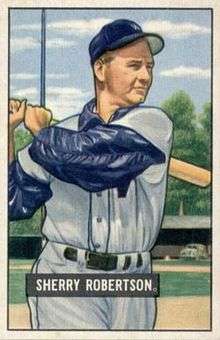Sherry Robertson
Sherrard Alexander Robertson (January 1, 1919 – October 23, 1970) was a Canadian-American utility player, front office executive, and coach in Major League Baseball (MLB). He played three outfield and three infield positions over his MLB career for the Washington Senators and Philadelphia Athletics, including 109 games as a second baseman, 104 as a right fielder and 98 as a third baseman.[1][2]
| Sherry Robertson | |||
|---|---|---|---|
 | |||
| Utility player | |||
| Born: January 1, 1919 Montreal, Quebec, Canada | |||
| Died: October 23, 1970 (aged 51) Houghton, South Dakota | |||
| |||
| MLB debut | |||
| September 8, 1940, for the Washington Senators | |||
| Last MLB appearance | |||
| September 21, 1952, for the Philadelphia Athletics | |||
| MLB statistics | |||
| Batting average | .230 | ||
| Home runs | 26 | ||
| Runs batted in | 151 | ||
| Teams | |||
| |||
| Career highlights and awards | |||
| |||
Member of Griffith baseball dynasty
The nephew of Baseball Hall of Fame pitcher, manager and club owner Clark Griffith, Robertson was part of an extended family that operated the Washington Senators/Minnesota Twins franchise of the American League for 72 years. Robertson was a native of Montreal, Quebec, the son of a minor league player; his father was Griffith's brother-in-law. Robertson moved to the Washington, D.C., area with his widowed mother and six siblings when he was a child. He attended the University of Maryland.
Robertson's brother Calvin was adopted by Clark Griffith, took his uncle's last name and succeeded him as the Senators' president. Calvin Griffith controlled 52 percent of the team's stock (his 26 percent share in addition to sister Thelma Griffith Haynes' equal stake) and operated the Senators as majority owner from 1955–60. He then moved the club to Minneapolis–St. Paul after the 1960 season, and led the renamed Twins until he sold them in August 1984.
Sherry Robertson was the longtime director of the team's farm system,[3] and two other brothers, Jimmy and Billy Robertson, were also club executives. In addition, brother-in-law Joe Haynes, a former Washington pitcher, was an executive vice president of the Senators and Twins; another brother-in-law, Joe Cronin, was a Hall of Fame shortstop who was player-manager of the Senators in 1933–34 (leading them to the 1933 AL pennant), manager and then general manager of the Boston Red Sox (1935–58), and president of the American League (1959–73); and at least two nephews, Clark Griffith II and Bruce Haynes, took active roles in managing the Twins' affairs.
On-field career
Robertson batted left-handed, threw right-handed, and was listed as 6 feet (1.8 m) tall 180 pounds (82 kg). His playing career extended from 1939–52, with time out for service in the United States Navy Reserve during World War II.[4] He played for his brother Calvin with the Class B Charlotte Hornets in both 1939 and 1940 during Griffith's apprenticeship as a minor league manager.
Robertson saw MLB action with the Senators (1940–41, 1943 and 1946–52) and Philadelphia Athletics (1952). In ten seasons he played in 597 games and had 1,507 at bats, scored 200 runs, and compiled 346 hits, 55 doubles, 18 triples, 26 home runs, 151 runs batted in, 32 stolen bases, 202 walks, with a .230 batting average, .323 on-base percentage, .342 slugging percentage, 515 total bases and 14 sacrifice hits.
After succeeding Ossie Bluege as the Senators' farm system director in 1958, then moving to Minnesota along with the franchise after the 1960 season, Robertson returned to uniform as a bench coach with the Twins in 1970. After that season, he died from injuries suffered in an automobile accident in Houghton, South Dakota, at the age of 51.[5] He was elected to the Canadian Baseball Hall of Fame in 2007.
Robertson was the first Major League Baseball player to inadvertently kill a spectator at a baseball game, and the only one ever to do so with a thrown ball. During a 1943 game at Griffith Stadium against the Cleveland Indians, Robertson fielded a grounder hit by Ken Keltner. His throw to first baseman Mickey Vernon was high, and went into the front row of the stands, where it struck 32-year-old Clarence Stagemyer, who, after shaking his head a few times, said he was alright. Nevertheless, the Senators' team doctor looked him over and told him to go to the hospital. Stagemeyer did, and died there the following day of concussion and a skull fracture.[6]
Navy service
Robertson joined the Navy Reserve in 1944. On October 25, 1944, he reported aboard the Naval Air Station Kaneohe Bay, Hawaii as a Specialist (Physical Training Instructor) 1st Class Petty Officer.[7] He played baseball for the NAS Kaneohe Bay Klippers and the Navy All-Stars in 1945.
References
- Baseball Reference
- Retrosheet
- Canadian Baseball Hall of Fame
- "Those Who Served A–Z", Baseball in Wartime.com
- Snyder, John, Twins Journal: Year-by-Year and Day-by-Day With the Minnesota Twins Since 1961. Clerisy Press, 2010, page 89
- Weeks, David; Gorman, Robert (2015). "15: Fans". Death at the Ballpark: More Than 2,000 Game-Related Fatalities of Players, Other Personnel and Spectators in Amateur and Professional Baseball, 1862–2014 (2nd ed.). McFarland. p. 161. ISBN 9780786479320. Retrieved March 15, 2019.
- United States Navy. "Muster Roll of the Crew of the Naval Air Station, Kaneohe Bay for the quarter ending 31st March 1945", page 88. Note: Date first received on board was "10-25-44" and present rating was "Sp(A)1c(T)".
External links
- Career statistics and player information from Baseball-Reference, or Baseball-Reference (Minors)
- Sherry Robertson at Find a Grave
